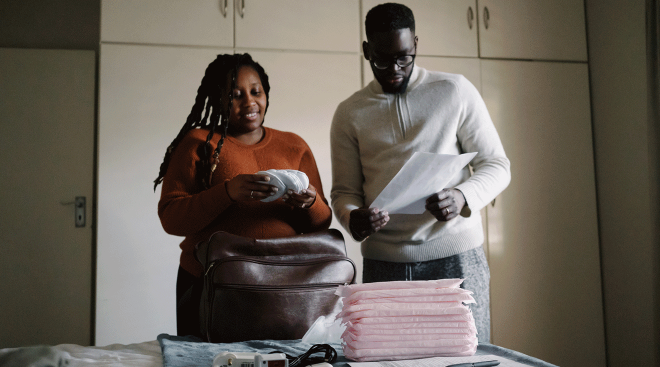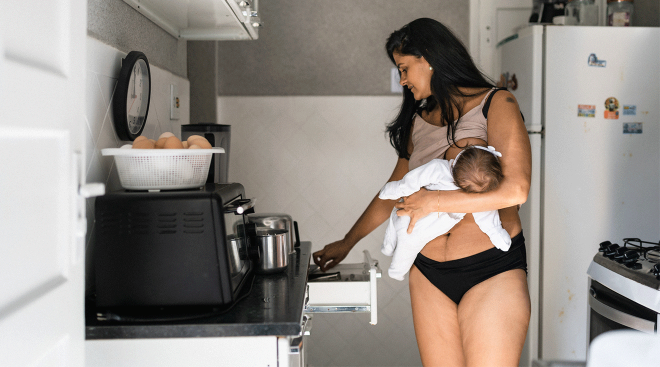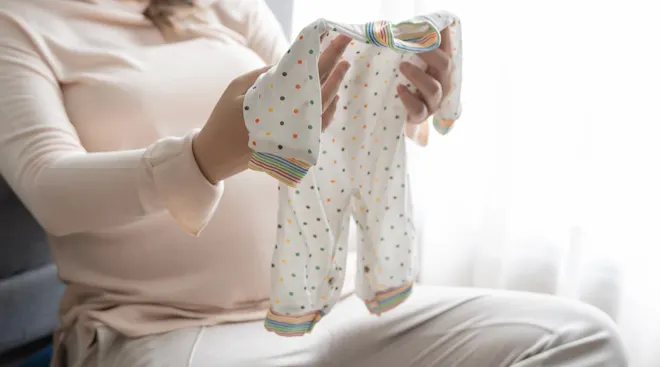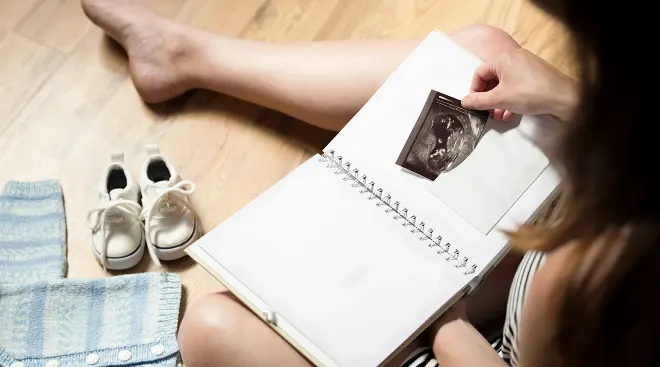- Braxton Hicks are the name of the game these days. Basically, your uterus is practicing; you’ll feel your belly tighten and then loosen. It's more likely to happen after some physical exercision. Try to relax or change positions. If they continue to happen and get closer together, call your doctor to rule out preterm labor.
- Baby’s kicks and jabs feel a lot less cute these days. That’s because they’re in cramped quarters and don’t have much room to wiggle and flip—so elbow jabs become sharper and more pronounced.
- Do you suddenly have the urge to organize everything? It’s called nesting. It’s totally understandable if you want to get everything ready at home for this big life change. Enjoy decorating the nursery and laundering those itty-bitty onesies, but try to take it easy and don’t over-exert yourself.
Starting to feel like a walking belly? Your 30 weeks pregnant belly is doing more than just making it tough to find a comfortable sleeping position—it’s made itself a conversation piece. Everywhere you go, someone seems to have a comment about how you look. Try not to take those comments seriously, but know which ones should be taken to heart—like when someone tells you you’re glowing, believe them. You are!
Wish you get get a look at baby in the womb at 30 weeks? If you could see into your 30 weeks pregnant belly, you’d see one cute 30-week fetus! By week 30, baby has a good amount of hair on their head and eyes that open wide to begin to distinguish what they see around them. Baby is also growing fingernails and continuing to practice grabbing by holding their feet or umbilical cord.
Baby’s skin looks smoother at 30 weeks of pregnancy, thanks to an increase in fat stores underneath. Incredibly, human fetuses accumulate more fat than any other mammal. All that fat serves an important purpose: It helps to regulate baby’s body temperature, both now and after birth. It also serves as an important energy store that supports the immense needs of the brain—which churns through about 20 percent of all of the calories we consume.
Now that baby has developed more fat stores, they’re starting to shed lanugo—the soft, down-like hair that enveloped the body for the last few weeks. Lanugo helps to keep a fetus warm and protects their sensitive developing skin with the help of vernix (a waxy substance covering the body, which is also disappearing about now). Lanugo also helps baby to grow rapidly by sending signals to their brain when it moves. As lanugo disappears in this final trimester, baby’s growth will slow (although it won’t feel that way, given your increasingly big bump).
How big is baby at 30 weeks?
At 30 weeks pregnant, baby is the size of a zucchini. Your 15.7-inch, 2.9-pound, 30-week fetus continues to grow about half a pound and half an inch each week, which is why your 30 weeks pregnant belly is feeling so tight.
30 weeks pregnant is how many months?
Thirty weeks pregnant is over seven months pregnant. Once you look at 30 weeks in months, you’ll realize how close you really are! Just 10 weeks to go (give or take, of course!).
30 week ultrasound
If you have an uncomplicated pregnancy, you probably won’t have a 30 weeks pregnant ultrasound. But if you could see what baby’s up to, here’s what you’d find: Your 30-week fetus’s skin is starting to get smoother, but their brain is getting wrinklier—that’s to make way for all that essential brain tissue. Your baby at 30 weeks is now strong enough to grasp a finger! That’s a skill they’ll certainly use post-birth.
Are you 30 weeks pregnant with twins? So far, your twins probably have been growing at the same rate as any other babies in utero. But sometime between now and week 32, they might slow down a bit.
Around week 30 of pregnancy with twins, your OB may order a biophysical profile to be taken of your babies. This is a combo of a 30-week ultrasound and a non-stress test (NST). For the NST, you’ll have sensors put on your belly to detect and measure your contractions and the babies’ heart rates. The test is designed to check how a baby’s heart rate responds when they move. If everything seems okay with the NST and the ultrasound, your doctor will rule out fetal distress and preterm labor to assure your twosome is doing just fine.
At week 30 of pregnancy, your dreams might be getting even weirder— if you’re actually sleeping, that is. That could be the result of hormones, but it could also be anxiety, so consider doing some prep work to help you rest easier. One idea? Do a test drive to see exactly how long it takes you to get to the hospital. Then maybe you’ll stop having nightmares about giving birth in your car. Here are other common 30 weeks pregnant symptoms:
Heartburn
If you’re feeling the burn, pay attention to which foods may be causing it. (Often, it’s greasy, heavy, spicy or acidic food.) Avoid them as much as you can, especially before bedtime, since this annoying 30 weeks pregnant symptom can make sleep hard to come by.
Trouble sleeping
You’re tossing and turning because you can’t get comfortable, and because your mind is racing. It’s a vicious cycle that leads to another issue: fatigue.
Swelling
A little puffiness is to be expected and will typically go down if you put your feet up for a while. Just know that sudden or severe swelling can be a sign of a problem, so keep an eye out for that.
General discomfort
Thanks to your big belly, your back aches, your hips ache and your feet… well, they ache too!
Shortness of breath
Those lungs just keep getting more crowded, right? Baby is still up high near your rib cage during pregnancy at 30 weeks but should drop down into your pelvis a little later in your pregnancy—maybe as soon as week 33 or 34. You’ll know when they do, because you’ll be able to take a deep breath again. Ah!
What to expect at 30 weeks pregnant
At 30 weeks pregnant, a lot of those early symptoms are returning. Ugh. You’re probably starting to feel exhausted and moody again, and you need to pee all the time again too. This can be frustrating (which isn’t helped by the mood swings!), but with just 10 more weeks to go, you can do this. Rest as much as you can and find ways to take care of your physical and mental health.
Whoa! You might notice your 30 weeks pregnant belly getting pretty hard and tight at times. Yep, at 30 weeks pregnant, Braxton Hicks contractions are pretty common. These are your body’s way of gearing up for the main event (labor, of course). Braxton Hicks tend to happen after exercise or sex, or when you’re tired or dehydrated. If you get them, sit down or lie on your side, relax and drink water. If the contractions don’t stop, or if you have four or more in an hour, call your doctor. It could actually be preterm labor.
Total 30 weeks pregnant weight gain should be about 18 to 25 pounds. If you’re pregnant with twins, you can expect to gain about 1.5 pounds per week in the second and third trimester. Fundal height—the distance from your pubic bone to the top of your uterus—should be around 28 to 32 centimeters.
Worried about the weight gain? Don’t be. The extra pounds you’ve put on will act as reserves to help you breastfeed baby. There’s no need to agonize over them or to rush to take them off; it will have taken you nine months to put the weight on, and it will take at least that long to take it off. Do keep your eye on the scale, however, because sudden or drastic weight gain could be the sign of a serious pregnancy complication called preeclampsia, so you should notify your doctor right away if the number on your scale jumps higher than it usually does week to week.
What is baby’s position at 30 weeks?
During pregnancy at 30 weeks, baby’s position is most likely head down (although it’s okay if they’re not yet!). Your 30-week fetus is floating comfortably in about 1½ pints of amniotic fluid. It may seem cramped in there, but they still have room to move around. Over the upcoming weeks, your belly will grow even further past your rib cage to accommodate baby, but they’ll still get a little more crowded as you approach your due date.
Navigating life with your bump may feel like a workout in itself… Think of yourself as an athlete—training at altitude while wearing a weighted vest! Your body is working really hard and scaling back when you need to is okay… Go for a brisk walk, take the stairs, park a little further from your destination, stretch on your lunch break and make it a priority to stay as mobile as possible every day… Exercise during this time is going to continue to improve your physical, emotional and mental well-being.
Ten weeks to go! Time will somehow move fast and slow at the same time. Here’s what to prioritize this week and beyond.
Wear forgiving shoes
The last trimester of your pregnancy is probably not going to be the most fashion-forward. Comfort reigns supreme, and your shoe situation should be no different. Your feet are probably swollen and achy most of the time, and tight shoes are not going to help the ouch, so find some shoes that have some give or leave room for your feet to expand.
Make sure you’re ready
It might seem early to get your go bag prepped and by the door, your car seat in the car and baby’s space all set up, but trust us, it’s better to be ready too early than too late (and you don’t want to have to try to remember all that while you’re in labor). Besides, getting everything ready is kinda fun!
Get familiar with the mucus plug
If you don’t know what the mucus plug is, now is the time to learn. In short, the mucus plug stops up the cervical opening and protects baby from any bacteria. Once it’s getting close to the time for baby to come, you’ll lose your mucus plug. This shouldn’t happen quite yet, but it’s good to know it’s coming since it’s, um, mucus-y.
Keep up with the Kegels
Doing your Kegels helps keep your vaginal and perineal muscles in good shape, which will be super helpful when it’s time to give birth. Kegels could also help you avoid peeing your pants, which, let’s be honest, is a real possibility these days.
Frequently Asked Questions
Should I consider cord blood banking?
It’s definitely worth talking to your doctor about banking baby’s cord blood (the blood that remains in the umbilical cord after birth). Cord blood contains hematopoietic stem cells. This precursor cell can become any type of blood cell. It’s otherwise only found in bone marrow, which is much more difficult to collect. Cord blood can be stored and used to treat more than 70 conditions, including some types of cancer, neurologic disorders, genetic disorders and immune system diseases.
The American College of Obstetricians (ACOG) recommends banking baby’s cord blood—not for your own baby, but to give away to others. While you can pay to have baby’s cord blood preserved at a private bank, ACOG says it’s not a worthwhile insurance unless baby or a family member has a disorder that could benefit from a cord blood transplant. When donated to a public bank, cord blood has the potential to save lives.
How much calcium should I be taking during week 30 of pregnancy?
Whether or not you’re pregnant, you should aim to get 1,000 mg of calcium per day (1,300 mg if you’re a teen). Hitting this goal is more important than ever in the third trimester, when baby’s bones are hardening with the help of calcium.
When baby can’t get enough calcium from the foods you eat, your body will pull from the calcium stores in your bones—increasing the risk of brittle bones later in life. Aim to eat three servings of calcium-rich foods per day, such as cheese, milk, yogurt, calcium-fortified cereal or soy milk, green leafy veggies (like spinach) and fish with the bones in (like canned salmon or sardines).
How can I relieve pregnancy headaches during the third trimester?
Headaches are, unfortunately, a common third trimester symptom. They’re likely due to the increased weight of baby, which can increase tension on your body and impact your posture, along with other factors like stress and lack of sleep. Acetaminophen (Tylenol) is generally considered safe to take during pregnancy. To prevent headaches, aim to keep stress in check, exercise a bit every day, eat regular and frequent meals, drink lots of fluids and prioritize sleep.
Keep in mind that headaches can be a sign of preeclampsia, or high blood pressure during pregnancy that usually begins after week 20. Let your doctor know if you have severe headaches, especially if you have vision problems, vomiting or sudden swelling in your hands and feet.
Is it too late to switch practices?
If you feel uncomfortable or are otherwise not satisfied with the care you’re receiving from your practitioner, don’t feel obligated to stay: It’s not necessarily too late to switch practices. Changes to your location or insurance, personality conflicts or fundamentally different views on labor and delivery are all good reasons to switch. The main issue is finding a new practitioner who will take you on. Fortunately, you still have plenty of time at 30 weeks to find a better fit. That said, some insurances won’t allow you to switch at this point, so you’ll need to do your due diligence.
How can I deal with belly button discomfort during pregnancy?
Belly button feeling extra sensitive and sore? It’s probably because your skin is stretched and rubbing against your clothing. To relieve the discomfort, try covering your belly button with a bandage or wearing loose clothes. Be sure to let your doctor know if you feel a hard mass around your belly button, which could signal an umbilical hernia (i.e., your intestines pushing out into your belly button).
Sex got a little awkward toward the end of pregnancy. That big bump presented a bit of a physical challenge. But a little creativity and willingness to laugh about it helped. Sex also often resulted in a full hour of Braxton Hicks—which was weird! Still, it was nice to feel close to my partner who loved my body throughout the entire pregnancy journey.
Please note: The Bump and the materials and information it contains are not intended to, and do not constitute, medical or other health advice or diagnosis and should not be used as such. You should always consult with a qualified physician or health professional about your specific circumstances.
American Pregnancy Association, Braxton Hicks Contractions – Causes, Symptoms & Pain Relief
Kaiser Permanente, Counting Kicks
American Pregnancy Association, Nesting During Pregnancy
Mayo Clinic, Fetal Development: The 3rd Trimester, June 2022
Cleveland Clinic, Fetal Development, March 2023
IFAS Extension, University of Florida, Squash, Zucchini—Cucurbita Pepo L., October 2018
American Pregnancy Association, 30 Weeks Pregnant: What Changes Are Occurring in Your Body?
National Institutes of Health, Fetal Weight Gain at Term: Linear with Minimal Dependence on Maternal Obesity
New York State Department of Health, Why Is 40 Weeks So Important? April 2021
National Institutes of Health, Sonography 3rd Trimester and Placenta Assessment, Protocols, and Interpretation, June 2023
Mount Sinai Hospitals, Fetal Development
National Institutes of Health, Palmar Grasp Reflex, October 2022
National Institutes of Health, Differences in Fetal Growth Patterns Between Twins and Singletons, August 2020
Cleveland Clinic, Biophysical Profile, December 2022
National Institutes of Health, Nonstress Test
Sleep Foundation, How Pregnancy Affects Dreams, May 2023
Cleveland Clinic, Heartburn During Pregnancy, January 2021
Sleep Foundation, Sleeping While Pregnant: Third Trimester, March 2023
Mayo Clinic, What Causes Ankle Swelling During Pregnancy — and What Can I Do About It? July 2022
National Institutes of Health, Aches and Pains During Pregnancy, November 2022 Harvard Medical School, Shortness of Breath In Pregnancy
Nebraska Medicine, You Asked, We Answered: Is Rib Pain During Pregnancy Normal? April 2022
Cleveland Clinic, Fetal Positions for Birth, March 2020
American College of Obstetricians and Gynecologists, How Much Weight Should I Gain During Pregnancy? August 2021
American College of Obstetricians and Gynecologists, Weight Gain With Twins
Cleveland Clinic, Fundal Height, January 2022
Mayo Clinic, Women’s Wellness: Breastfeeding and Weight Loss, August 2017
National Institutes of Health, Losing Weight After Pregnancy, October 2021
Mayo Clinic, Preeclampsia, April 2022
Cleveland Clinic, Fetal Positions for Birth, March 2020
National Institutes of Health, Amniotic Fluid, November 2022
Johns Hopkins Medicine, The Third Trimester
Lamaze International, Swelling in the Third Trimester: What's Normal, When to Worry, What to Do, March 2018
Cleveland Clinic, Mucus Plug, July 2021
American Pregnancy Association, Kegel Exercises: Benefits and How to Do Them
Learn how we ensure the accuracy of our content through our editorial and medical review process.
Navigate forward to interact with the calendar and select a date. Press the question mark key to get the keyboard shortcuts for changing dates.
















































